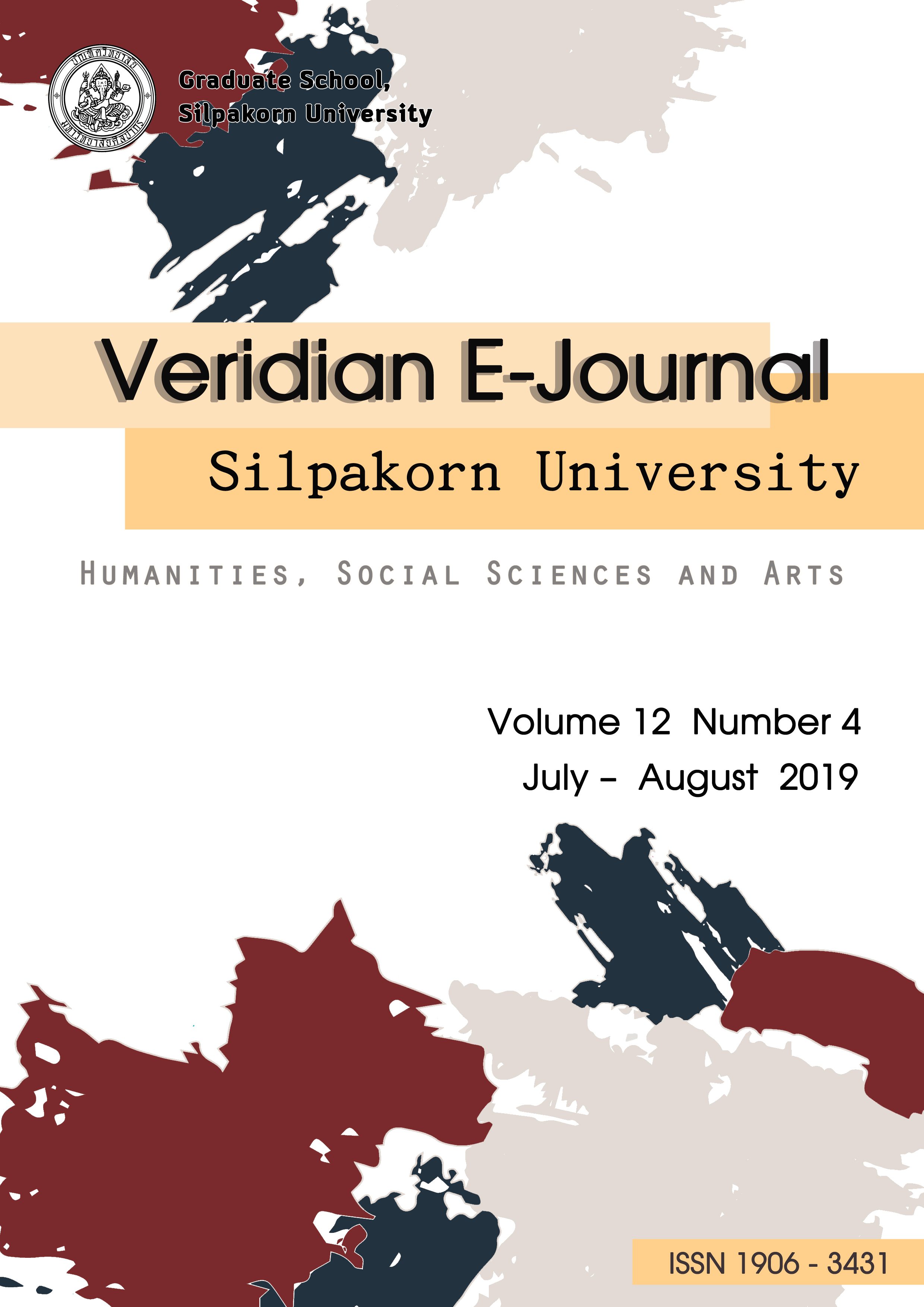การศึกษาวิเคราะห์หลักธรรมาภิบาลในพระพุทธศาสนา (An Analysis of Good Governance in Buddhism)
Main Article Content
บทคัดย่อ
งานวิจัยนี้มีวัตถุประสงค์ ดังนี้ 1) เพื่อศึกษาหลักธรรมาภิบาลตามระเบียบสำนักนายกรัฐมนตรี2) เพื่อศึกษาหลักธรรมเกี่ยวกับธรรมาภิบาลตามแนวพระพุทธศาสนา 3) เพื่อวิเคราะห์ประโยชน์และคุณค่าของธรรมาภิบาลตามแนวพระพุทธศาสนา งานวิจัยนี้เป็นการวิจัยเชิงเอกสาร ผู้วิจัยได้ศึกษาค้นคว้าแนวคิดเกี่ยวกับธรรมาภิบาลจากแหล่งข้อมูลปฐมภูมิได้แก่ คัมภีร์พระไตรปิฎก และแหล่งข้อมูลทุติยภูมิจากหนังสือ เอกสาร วารสาร และงานวิจัยที่เกี่ยวข้อง โดยเสนอผลการวิเคราะห์ข้อมูล อภิปรายผลและข้อเสนอแนะเชิงพรรณนา
ผลการศึกษาพบว่า
1) หลักธรรมาภิบาล ประกอบด้วยหลักสำคัญ 6 ประการ คือ 1) หลักนิติธรรม ได้แก่การตรากฎหมาย กฎระเบียบและข้อบังคับให้มีความทันสมัย เป็นธรรมกับทุกฝ่ายโดยไม่เลือกปฏิบัติ 2) หลักคุณธรรม ได้แก่ การเชิดชูส่งเสริมคุณธรรม ยึดมั่นในความถูกต้องดีงาม สนับสนุนให้เจ้าหน้าของรัฐและประชาชน มีความซื่อสัตย์ จริงใจ ขยัน อดทน มีระเบียบวินัย ประกอบอาชีพที่สุจริต 3) หลักความโปร่งใส ได้แก่ การสร้างความไว้วางใจซึ่งกันและกันโดยการปรับปรุงกลไกการทำงานของทุกองค์กรให้มีความโปร่งใส มีการเปิดเผยข้อมูลอย่างตรงไปตรงมา ประชาชนสามารถเข้าถึงข้อมูลได้สะดวก 4) หลักการมีส่วนร่วม ได้แก่การเปิดโอกาสให้ประชาชนมีส่วนร่วมในการแสดงความคิดเห็น การวางแผน การกำหนดนโยบายและการตัดสินใจปัญหาสำคัญของประเทศ 5) หลักความรับผิดชอบ ได้แก่ การเอาใจใส่ปัญหาสาธารณะ การตระหนักในสิทธิหน้าที่และความรับผิดชอบต่อสังคม และความกล้าที่จะยอมรับผลของการกระทำ 6) หลักความคุ้มค่า ได้แก่การใช้สอยทรัพยากรที่มีอยู่อย่างจำกัดเพื่อให้เกิดประโยชน์สูงสุด ส่งเสริมให้ประชาชนไม่ฟุ่มเฟือย รู้จักประหยัดและใช้สอยสิ่งของอย่างคุ้มค่า
2) หลักคำสอนเกี่ยวกับธรรมาภิบาลตามแนวพระพุทธศาสนา มีดังนี้คือ 1. หลักนิติธรรม พระพุทธเจ้าทรงบัญญัติพระวินัยด้วยความเสมอภาค และยุติธรรมโดยปราศจากการเลือกปฏิบัติ พุทธศาสนิกชนจะต้องประพฤติปฏิบัติตามหลักธรรมวินัยอย่างเท่าเทียม 2. หลักคุณธรรม พระพุทธศาสนายกย่องเชิดชูคุณธรรมเหนือสิ่งอื่นใด หลักธรรมเกี่ยวกับธรรมาภิบาลในพระพุทธศาสนามีอยู่เป็นจำนวนมากเช่น หลักทศพิธราชธรรม หรือคุณธรรมสำหรับนักปกครอง เป็นต้น 3. หลักความโปร่งใส พระพุทธศาสนาสอนให้ยึดมั่นในหลักคุณธรรมและจริยธรรมเพื่อให้เกิดความโปร่งใสทางกาย วาจา และจิตใจ ตามหลักกายสุจริต วจีสุจริต และมโนสุจริต 4. หลักการมีส่วนร่วม พระพุทธศาสนาให้ความสำคัญกับหลักการมีส่วนร่วมอย่างมาก เช่น หลักอปริหานิยธรรม คือหลักธรรมที่เป็นไม่มีความเสื่อม เป็นไปเพื่อความเจริญฝ่ายเดียว 5. หลักความรับผิดชอบ พระพุทธศาสนาสอนว่าทุกคนเกิดมาพร้อมกับหน้าที่และความรับผิดชอบทั้งต่อตนเอง ญาติพี่น้อง และสังคม และบุคคลทุกคนจะต้องรับผิดต่อการกระทำของตน 6. หลักความประหยัดและคุ้มค่า พระพุทธศาสนาสอนให้รู้จักประหยัดในการใช้สอยทรัพยากรอย่างคุ้มค่า เช่น หลักคำสอนเรื่องมัตตัญญุตา คือ ความรู้จักประมาณในการบริโภคและใช้สอยสิ่งที่มีอยู่ พระพุทธศาสนาไม่ส่งเสริมให้ใช้ชีวิตอย่างฟุ่มเฟือย
3) ธรรมาภิบาลตามแนวพระพุทธศาสนามีประโยชน์และคุณค่า ดังนี้คือ ด้านการปกครอง ทำให้การปกครองมีความเป็นระเบียบเรียบเรียบ ช่วยขจัดปัญหาทุจริตและคอรัปชั่น ด้านเศรษฐกิจ ทำให้เกิดความยุติธรรมและความเสมอภาคในการประกอบอาชีพ ส่งเสริมสิทธิและเสรีภาพในการดำเนินธุรกิจตามกำลังความรู้ความสามารถ และด้านสังคม ช่วยส่งเสริมให้สังคมอยู่อย่างมีความสุขและสันติภาพ เสริมสร้างความเท่าเทียมกัน ส่งเสริมสิทธิมนุษยชน และสร้างสังคมให้มีความสามัคคีเป็นปึกแผ่นและเป็นอันหนึ่งอันเดียวกัน
The purposes of this research were: 1) to study the principles of good governance according to the regulations of the office of the prime minister; 2) to study Buddhist teachings related to good governance 3) to analyze the benefits and values of Buddhist good governance. This is a qualitative research. The researchers have studied and discovered the principles of good governance from primary sources which are Thai Tipitakas, and from secondary sources which are books, documents, journals, and related researches. The data were analyzed, discussed, and presented in descriptive details along with analysis and recommendation per each aspect.
The results of the research found that:
- The principles of good governance comprised of 6 important components: 1) Rule of law: enacting law, rule and regulation which are update, fair and just to everyone without discrimination. 2) Merit: praising virtue and merit; adhering to the rightness and goodness; and encouraging government officials and people to have honesty, sincerity, diligence, patience, discipline, and perform trustworthy occupation. 3) Transparency: creating trust among each other by improving working mechanism of each organization to be transparent by revealing information straightforwardly, and providing ease to people in accessing the information. 4) Participation: Providing opportunities to people to participate, express ideas, set up plan and policy, and make decision on important issues. 5) Accountability: paying attention to public problems; placing importance on right, duty and social responsibility as well as having braveness to accept the results of his or her own conduct. 6) Economy: using limited resources for the great benefits; encouraging people not to spend luxurious life, and knowing to save and use resources worthily.
- The principles of good governance in Buddhism can be presented as follows: 1) Rule of law: The Buddha enacted discipline with equity and fairness without discrimination; all Buddhist people have to practice in the same rule and discipline equally. 2) Merit: Buddhism praises merit and virtue more than other things. There are many Buddhist teachings related to good governance which can be presented as Dasarajadhamma or the tenfold code of the king or virtues of the ruler. 3) Transparency: Buddhism encourages Buddhist people to practice in the rule and discipline to be transparent by having good conduct in action, good conduct in word, and good conduct in thought. 4) Participation: Buddhism places great importance on participation; this can be seen in Aparihaniyadhamma, which means the principles leading never to decline but only to prosperity. 5) Accountability: Buddhism teaches that everyone is born with duty and responsibility to themselves, to their relatives and society; everyone has to be responsible for his or her own conduct. 6) Economy: Buddhism teaches people to use resources with saving and worthiness such as the principle of moderation (Mattannuta) which suggests people to have moderation, temperance, and sense of proportion in spending resources.
3. Good governance in Buddhistic approach has benefits and values as follows: in terms of governance, it can help to improve the governance to have good discipline and regularity, eliminate misconduct and corruption. In terms of economy, good governance in Buddhistic approach can generate fairness and equity in carrying on an occupation, and improve right and freedom in doing business with knowledge and capability. In terms of society, good governance in Buddhistic approach encourages society to live with happiness and peace, create social equity and integrity, improve human right, and build society to have harmony and unity.

